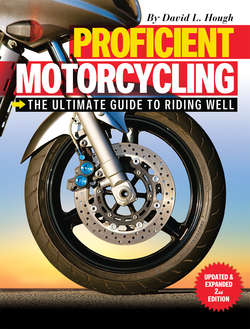Читать книгу Proficient Motorcycling - David L. Hough - Страница 30
На сайте Литреса книга снята с продажи.
Emergency Reactions Follow Habits
ОглавлениеOne of the most important lessons I’ve learned is that emergency actions follow habits. Riding through the high desert of eastern Oregon one night, my headlight beam suddenly picked up the reflection of two eyes alongside the road. I rolled off the throttle and squeezed the brake lever gently. This is deer country, and the reliable tactic for avoiding a deer strike is to stop short of a collision. Those shining eyes were too low to the ground to be a deer, but whether a deer, raccoon, or skunk, I didn’t want to hit it.
When the reflecting eyes suddenly darted toward the pavement, my hand squeezed the brake lever progressively harder, the machine transferred its weight onto the front tire, and my hand squeezed just hard enough to brake the front wheel to the maximum just short of a skid. Twenty feet from impact, the headlight beam illuminated a very large porcupine bobbling out toward the centerline, then changing its mind, making a U-turn, and scrambling back toward the verge. As Porky ambled off the pavement, my fingers eased off the brake, the suspension stabilized, and my hand rolled back on the throttle.
On a twisty road, it’s not uncommon for a driver with a wide vehicle to borrow the other side of the road in curves.
What amazes me still is that I don’t recall any decision to brake hard. My right hand just produced a classic quick stop, as if it had been controlled by some animal-sensing device programmed to make a stop in the shortest distance without crashing. Of course, we all carry such a device. It’s located on the bike somewhere between your ears. In an emergency, the brain follows whatever programs have been learned through practice. If you always favor the front brake for normal stops, and you have experienced enough power stops to know what an impending skid feels like, your brain has a quick-stop program available for emergencies.
The moral of that story is that if you expect to have the right skills for an emergency, you must constantly practice the right skills every time you ride. If you expect to be able to handle the loose gravel or the wandering motorist you discover as you round a blind turn, you must practice control skills such as countersteering, smooth throttle-to-brake transitions, and aggressive braking while leaned over.
To put this another way, there really aren’t any emergency maneuvers you can pull out of your bag of tricks when something goes wrong. You can practice special maneuvers, but the only ones that count are the control skills you practice every day as you ride along. And if we assume there are physical habits to be practiced, then there must also be proficient mental skills that we must practice so that they become habits as well.
